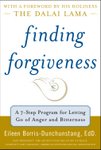The first step in your forgiveness journey begins with telling your story. For many of us this story can be a painful one. Something happened which frightened us, shocked us, made us very angry or hurt us deeply. In many cases when we retell our stories we portrayed ourselves as the victim.
Yes, many of us were victimized yet that doesn’t mean that we need to remain the victim. If this is what we choose to do, we have just disempowered ourselves creating more pain to deal with. We get stuck in the victim role when we take the hurt personally and we don’t take responsibility for how we feel. Just because something awful has happened it does not mean that we have to relive it day after day.
You might be thinking, how can I not take my spouse’s extramarital affairs or emotional abuse personally. You stop taking things personally when you begin to ask the questions, why them instead of why me. What has happened in their lives that have created pain that has made them who they are today? This helps you realize that anyone in your position at that given time would have been treated in exactly the same way. When you recognize the impersonal nature of what has happened to you, then your pain does not have to cripple you.
Not taking things personally doesn’t mean that you ignore or excuse what has happened or deny your pain. It does mean that what has happened to you is not a unique situation. For example unfortunately in many marriages people have experienced pain because their spouses had extramarital affairs. When you can see the impersonal nature of the situation you can begin a new story of healing and forgiveness.
How do we fall prey to the victim role? In a sense it is part of our human condition. All of us want to present “the face of innocence.” We can be very loving, very charming, sweet and kind when we want to be. We can also find people to sympathize with us when we talk about how badly treated we may have been. We identify with other people who are also victims. We see ourselves as good people living with people who can be very hurtful. Yet underneath our innocence our anger grows because we see a world which is unable to provide nurturance and love. Because I am innocent I will not make the first attack, yet every day a hundred little things make small assaults upon our innocence, provoking irritation eventually escalating to anger in all its forms. When we choose to hold on to our pain what we are actually doing is pointing an accusing finger at the wrongdoer saying I am the innocent victim and as you look on me you are condemned because of my suffering.
The central lesson is that we have a tremendous investment in holding on to our pain so we can blame others, proving that I am right and you are wrong. When I point my finger at you, there is also a finger pointing back at me although we want to keep that buried deep within ourselves below our face of innocence. Never underestimate the power of denial for this is what keeps the dynamics of attack and defend alive and well.
It’s important to become aware of our own face of innocence. What keeps us stuck in the victim role is our inability to manage our emotional pain and to confront reality. When we break our denial of wanting to be right instead of happy we have begun our healing, moving away from victim to one who thrives.
There is a journal exercise which will help you move from a victim story to a hero’s story. Think of a time where you needed to forgive someone. Do you repeat your story over and over again and if so what is keeping you stuck and why? Write down whatever comes up for you without judgment. Allow yourself to feel whatever is happening within you. Give your emotions voice including your guilt by writing it down. When you feel that you have given your emotions full expression, ask yourself why them? What has happened in their life that has brought them where they were at the time the incident happened. Is there a way that you can look at your situation in a healthier way and see things a bit differently now? If you can’t, what are you still holding on to and why can’t you let it go. See what comes up for you and allow yourself to feel whatever emotions need more expression. If guilt keeps reappearing – ask yourself what can you do differently now to heal your guilt. Remember, you can’t change the past but you can make different choices now. Remember that holding on to guilt is a choice too.
You can repeat this exercise as often as you like to help you loosen the grip of your pain and move from victim of your circumstances to a hero. Be gentle with yourself and thank yourself for taking the time to walk the path of forgiveness.
Wednesday, February 17, 2010
Subscribe to:
Post Comments (Atom)



No comments:
Post a Comment